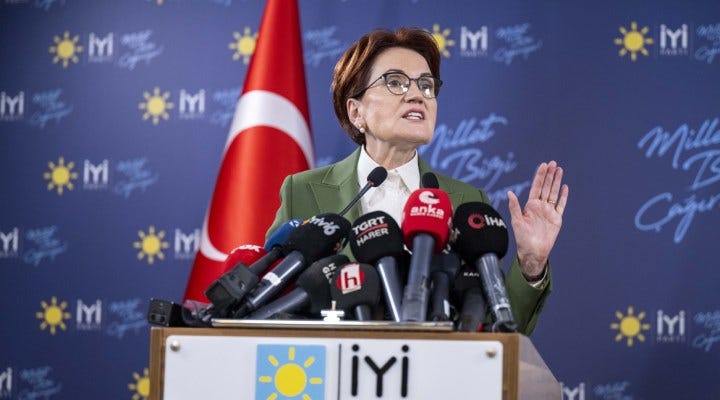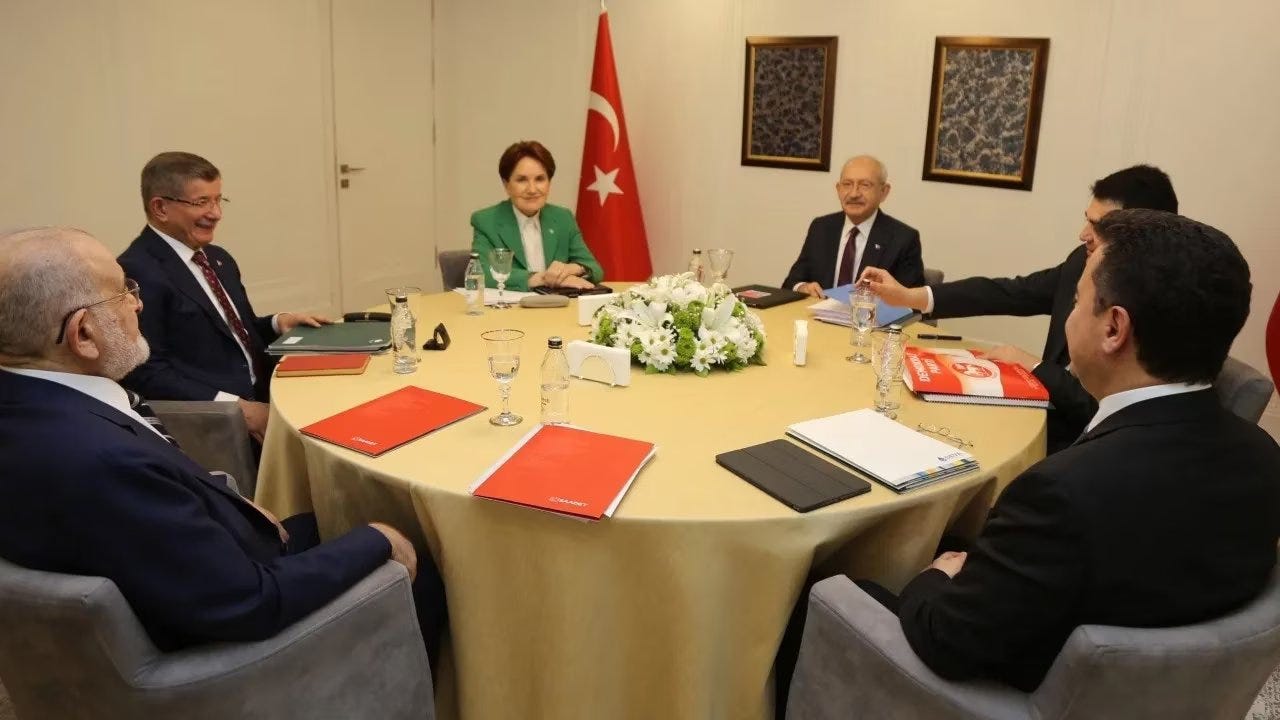Turkey's Marine Le Pen Sabotages Opposition's Prospects Ahead of Presidential Election
Less than a day after a nationalist politician broke away from an electoral alliance in a dispute over candidacy for the May presidential election, she got rebuke from mayors she nominated.

Only less than a day after IYI Party leader Meral Aksener split from the notoriously dysfunctional opposition alliance in a dispute over nominating the joint candidate for the upcoming presidential election in May, the names in her mind for nomination offered a stinging rebuke to the veteran nationalist politician. In a publicized and nasty political divorce at a press conference on Friday, Aksener, who is also known as Turkey’s Marine Le Pen, rattled off acrimonious remarks against her former political savior, secular main opposition Republican People’s Party (CHP) Chairman Kemal Kilicdaroglu, for what she claimed dictating his personal will on the five other members of the “Nation Alliance.”
“They left us to choose between death and malaria,” the Iron Lady said in a tone resembling a war declaration. The death, in her veiled description, refers to President Recep Tayyip Erdogan, while malaria unmistakable was meant for the CHP chairman whose chivalrous generosity saved the nationalist leader from sinking into political oblivion only five years ago.
The split came a few days before the opposition was poised to announce its joint candidate who will face Erdogan in the most critical election of the century. It was no secret to anyone that the CHP leader was expressing willingness to put his name on the ballot box to challenge Erdogan whose two-decade-plus grip on Turkey’s politics seriously appears in tatters after two earthquakes killed more than 50,000 people and exposed fatal incompetence on the part of authorities. The public anger is still raw, the wounds fresh, and the soul-searching over the sheer scope of destruction is still underway. In these circumstances, it is a bold and, no less risky, gamble for Erdogan to face the people’s will at the ballot box. The vote will be a referendum not just on his post-earthquake performance, but his entire time in power.
Instead of 74-year-old Kilicdaroglu, Aksener proposed two names: the popular Istanbul Mayor Ekrem Imamoglu and Ankara Mayor Mansur Yavas, both from CHP. Before the drama got more complicated, both mayors spurned Aksener’s proposals on Twitter.
Aksener’s public snub of Kilicdaroglu was saddled with contradictions from the beginning. First, the two names she came up with are already from Kilicdaroglu’s CHP, not from her own IYI Party. How can she dare to bypass another party’s chairman by proposing two candidates from that party? Did she have any idea how reckless her proposals were? Second, Aksener knew from the beginning that Kilicdaroglu never hid his ambitions for the candidacy. And there was a consensus. Other five parties in the alliance endorsed Kilicdaroglu’s bid. She did not.

One reason, party insiders muse, would be the identity of Kilicdaroglu. Both a Kurd and an Alevi from Dersim region, the stronghold of a famous rebellion in 1937, Kilicdaroglu’s name is considered a non-starter for the right-of-center voters. But three parties in the Nation Alliance are center-right and Islamist parties. They appeared comfortably content with the CHP chairman’s personal background, dismissing swirling rumors as vulgar nationalistic fervor and uncivilized. But Aksener comes from a staunchly nationalist background. Who Kilicdaroglu is, seemingly, matters to her political base. Yet, this rationale still fails to explain the mass exodus from Aksener’s party after her breakup with the alliance over considerations of Kilicdaroglu’s candidacy. Hundreds of party officials resigned after the Friday saga.
Her sabotaging act at a time when the opposition has a decent chance to unseat Erdogan in a fair and free election, if ever held, exploded as a bombshell on social media. Her Judas-style betrayal did not sit well with large segments of society.
It goes without saying that the real casualties of her suicidal act were her already-tarnished political reputation and the opposition’s rare chance to beat the sitting president. Given the lingering anger of the public over the botched rescue and relief efforts, observers reasoned that a snap election would not be in the best interests of the president. The ambiguity around the electoral date seemed all the more so when Erdogan’s confidante and former Parliament Speaker Bulent Arinc last week hinted at a potential postponement of the election for another year.
According to the grinding rumor mill, the state of emergency declared in 10 provinces would be nationwide and the government would use the post-disaster reconstruction process as a pretext to indefinitely delay democracy’s most cherished and sacred conduct—the vote. That was the crystallizing fear in the public. Until this week. Bracing the not-impossible prospect of a defeat at the ballot box, Erdogan gives victims of the quake and the broader public a chance to reflect their feelings in the most critical vote in modern Turkish history as Turkey celebrates the first centenary of the foundation of the Republic later this year. How his audacious endeavor will work out remains to be seen.
The history of Aksener’s defections and betrayals makes an impressive and stomach-turning read. In 2018, when the leader of the nationalist breakaway IYI Party, which splintered from the Nationalist Action Party (MHP), faced the prospect of exclusion from the Turkish Parliament over legal procedure, the main opposition CHP leader rushed to the rescue. CHP Chairman Kilicdaroglu literally dispatched 20 reluctant lawmakers to salvage IYI Party’s political future. The lawmakers were stripped of CHP membership as they joined the newly-formed IYI Party to ensure its participation in the next elections.
In return, IYI Party leader Meral Aksener refused to endorse the main opposition’s candidate in the presidential contest in June 2018, the first critical election after the country adopted a new constitutional amendment in a public referendum in April 2017. The CHP candidate Muharrem Ince suffered a heavy defeat against Erdogan, while Aksener split the opposition votes by separately running for the presidency in an ill-fated bid.
Despite her controversial record, she was allowed to join the Nation Alliance, only to sink it. Last year, Aksener snapped back when she was reminded of her political debt to the CHP leader. “We paid our debt on March 31 [municipal elections in 2019]. We even paid more than what we got.” In the 2019 local elections, Erdogan’s party lost major metropolitan cities, including Istanbul and Ankara, after an unassailable 25-year grip over those cities. The muscle of the Nation Alliance, along with Kurds’ support, proved pivotal to sway the voters in Istanbul and Ankara.
At a press conference later in the afternoon after Aksener’s ship-sinking act yesterday, the CHP leader chose not to strike back. In a conciliatory tone, he spoke of perseverance, optimism, and unity in an attempt to lift the moods. He did not entirely shut down the doors, leaving the back-channel diplomacy open for mending ties with the embattled IYI Party leader while Turkey slowly but steadily enters another election wilderness.
